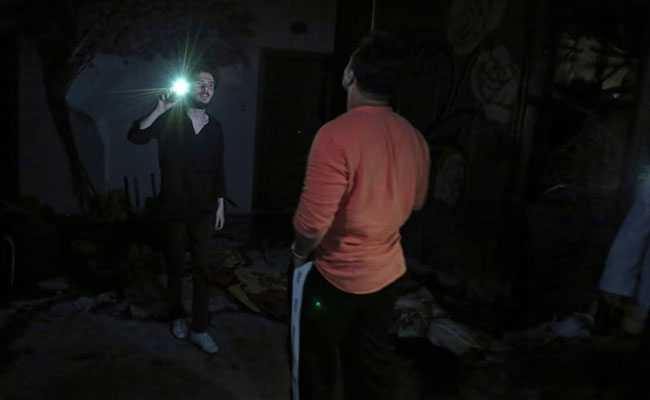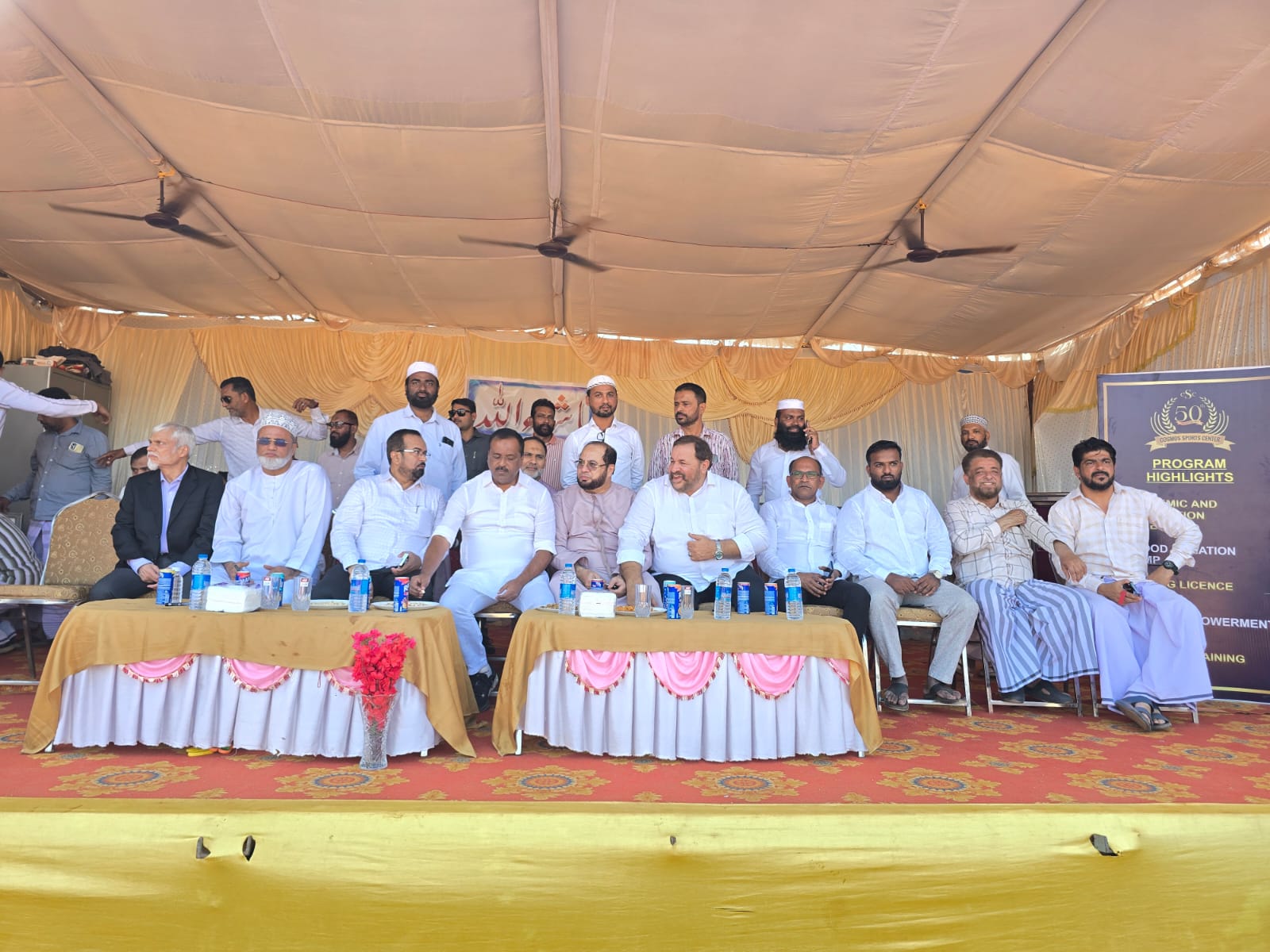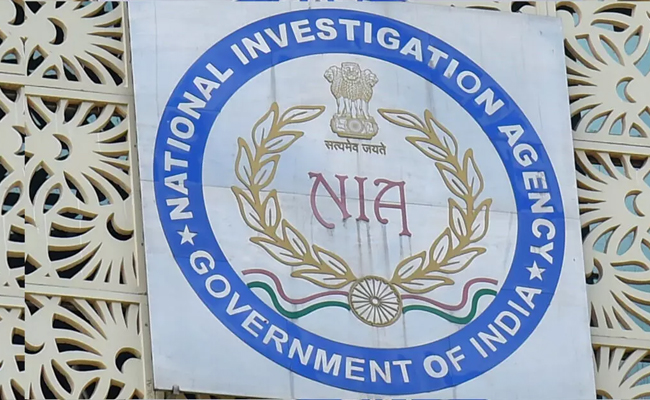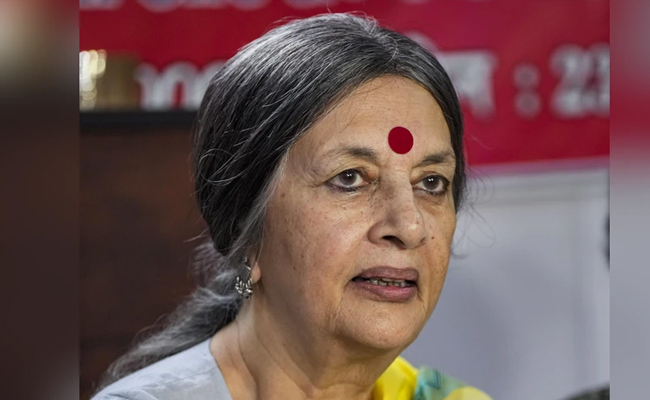Mosul (Iraq) (AP): A raging fire seemingly caused by fireworks set off to celebrate a Christian wedding consumed a hall packed with guests in northern Iraq, killing at least 100 people and injuring 150 others as authorities warned Wednesday the death toll could still rise.
Authorities said that flammable building materials also contributed to the latest disaster to hit Iraq's dwindling Christian minority. The fire happened in the Hamdaniya area of Iraq's Nineveh province, authorities said.
That's a predominantly Christian area just outside of the city of Mosul, some 335 kilometres (205 miles) northwest of Baghdad.
There was no official word on the cause of the blaze, but the Kurdish television news channel Rudaw aired footage showing fireworks shooting up from the floor of the event and setting a chandelier aflame.
In the blaze's aftermath, only charred metal and debris could be seen as people walked through the scene of the fire, the only light coming from television cameras and the lights of onlookers' mobile phones.
Survivors arrived at local hospitals in bandages, receiving oxygen, as their families milled through hallways and outside as workers organised more oxygen cylinders.
Some of those burned included children. Ambulance sirens wailed for hours after the fire as paramedics brought out the injured.
Other footage shown on other local television networks appeared to show the bride and groom on the dance floor when the fire began Tuesday night, stunned by the sight of the burning debris. It wasn't immediately clear if they were among those hurt.
"There were about to do a slow dance and then they lit up this thing for the dance which caught fire," one injured woman told Rudaw from a hospital gurney.
Another man injured in the fire at the hospital similarly told Rudaw that the blaze started as the couple prepared for their slow dance.
"They lit up fireworks," he said. "It hit the ceiling, which caught fire."
He added: "The entire hall was on fire in seconds."
Health officials in Nineveh province raised the death toll to 114, though federal officials did not immediately update their figure of at least 100 killed.
Health Ministry spokesman Saif al-Badr put the number of injured at 150 in that earlier statement carried by the state-run Iraqi News Agency.
"All efforts are being made to provide relief to those affected by the unfortunate accident," al-Badr said.
Ahmed Dubardani, a health official in the province, told Rudaw that many of those injured suffered serious burns.
"The majority of them were completely burned and some others had 50 to 60 per cent of their bodies burned," Dubardani said. "This is not good at all. The majority of them were not in good condition."
Prime Minister Mohammed Shia al-Sudani ordered an investigation into the fire and asked the country's Interior and Health officials to provide relief, his office said in a statement online.
Najim al-Jubouri, the provincial governor of Nineveh, said some of the injured had been transferred to regional hospitals.
He cautioned there were no final casualty figures yet from the blaze, which suggests the death toll still may rise.
Hamdaniya is on Iraq's Nineveh Plains and under the control of its central government, though it is close to and claimed by Iraq's semiautonomous Kurdish regional government.
Masrour Barzani, the prime minister of the Kurdish region, ordered hospitals there to also help those hurt in the blaze.
Father Rudi Saffar Khoury, a priest at the wedding, said it was unclear who was to blame for the fire.
"It could be a mistake by the event organizers or venue hosts, or maybe a technical error," Khoury told The Associated Press. "It was a disaster in every sense of the word."
Civil defense officials quoted by the Iraqi News Agency described the wedding hall's exterior as decorated with highly flammable cladding that is illegal in the country.
"The fire led to the collapse of parts of the hall as a result of the use of highly flammable, low-cost building materials that collapse within minutes when the fire breaks out," civil defense said.
It wasn't immediately clear why authorities in Iraq allowed the cladding to be used on the hall, though corruption and mismanagement remains endemic two decades after the US-led invasion that toppled Saddam Hussein.
While some types of cladding can be made with fire-resistant material, experts say those that have caught fire at the wedding hall and elsewhere weren't designed to meet stricter safety standards and often were put onto buildings without any breaks to slow or halt a possible blaze.
That includes the 2017 Grenfell Fire in London that killed 72 people in the greatest loss of life in a fire on British soil since World War II, as well as multiple high-rise fires in the United Arab Emirates.
Over the past two decades, Iraq's Christian minority has been violently targeted by extremists first from al-Qaeda and then the Islamic State militant group.
Although the Nineveh Plains, the historic homeland, was wrested back from the Islamic State group six years ago, some towns are still mostly rubble and lack basic services. Many Christians have left for Europe, Australia or the United States.
The number of Christians in Iraq today is estimated at 150,000, compared to 1.5 million in 2003. Iraq's total population is more than 40 million.
Let the Truth be known. If you read VB and like VB, please be a VB Supporter and Help us deliver the Truth to one and all.
Mumbai (PTI): In view of Argentine superstar footballer Lionel Messi's visit to Mumbai on Sunday, the city police are implementing stringent security measures, like not allowing water bottles, metals, coins inside the stadiums and setting up watchtowers to keep an eye on the crowd, officials said.
The police also said taking extra care to avoid any stampede-like situation and to prevent recurrence of the chaotic situation that unfolded in Kolkata during Messi's visit on Saturday as thousands of fans protested inside the Salt Lake stadium here after failing to catch a clear glimpse of the football icon despite paying hefty sums for tickets.
Messi is expected to be present at the Cricket Club of India (Brabourne Stadium) in Mumbai on Sunday for a Padel GOAT Cup event followed by attending a celebrity football match. He is expected to proceed to the Wankhede Stadium for the GOAT India Tour main event around 5 pm.
"In view of Lionel Messi's visit to Mumbai, the police are geared up and have put in place a high level of security arrangements in and around the stadiums located in south Mumbai. Considering the chaos that prevailed in Kolkata and the security breach, we have deployed World Cup-level security arrangements at Brabourne and Wankhede stadiums," an official said.
Expecting heavy crowd near the stadiums during Messi's visit, the city police force has deployed more than 2,000 of its personnel near and around both the venues, he said.
As the Mumbai police have the experience of security 'bandobast' during the victory parade of ICC World Cup-winning Indian team and World Cup final match at the Wankhede Stadium, in which over one lakh cricket fans had gathered, we are prepared to handle a large crowd of fans, he said.
"We are trying to avoid the errors that occurred in the past," the official said.
There is no place to sneak inside the stadiums in Mumbai like the Kolkata stadium, according to him.
The police are also asking the organisers to provide all the required facilities to the fans inside the stadium, so that there will be no chaos, he said, adding the spectators have purchased tickets in the range of Rs 5,000 to 25,000. After paying so much of amount, any spectator expects proper services, while enjoying the event, he said.
The police are expecting 33,000 spectators at the Wankhede Stadium and over 4,000 at Brabourne Stadium. Besides this, more than 30,000 people are expected outside and around the stadiums just to have a glimpse of the football sensation, he said.
The organisers responsible for Messi's India visit recently came to Mumbai to discuss security arrangements. During the meeting, the Mumbai police asked them not to take the event lightly, according to the official.
After those requirements were fulfilled, the final security deployment was chalked out, he said.
Police has the standard procedure of the security arrangements inside the Wankhede Stadium, where people are barred from taking water bottles, metals objects, coins. Police are setting up watch towers near the stadiums and there will be traffic diversions, so that there is maximum space available to stand, according to the official.
Police are also appealing to the spectators to use public transport service for commuting and avoid personal vehicles to reach south Mumbai.
To avoid any stampede-like situation, police are also taking precautionary measures and will stop the fans some distance ahead of the stadium and public announcement systems will be used to guide the crowd. Barricades will be placed at various places to manage the crowd.
In case the crowd swells up beyond expectation, the police will divert people to other grounds and preparations in this regard underway, he said.
Additional police force has been deployed in south Mumbai to tackle any kind of situation, he said.





